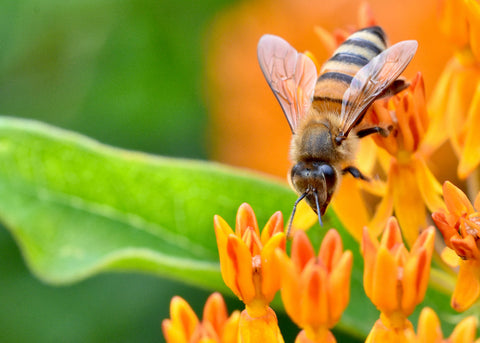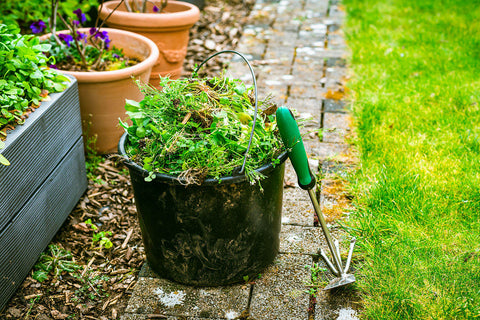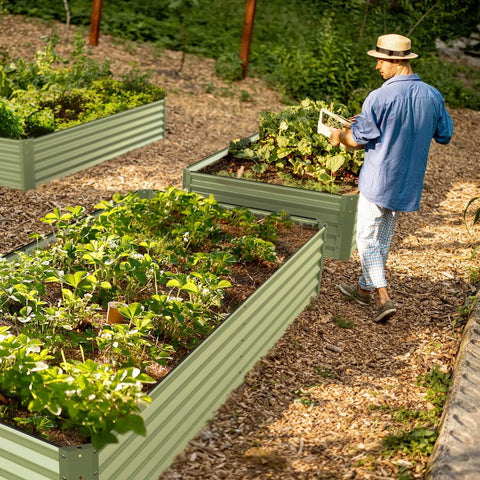Not everybody has a nice garden, but you shouldn’t be discouraged from doing gardening. New fruits, vegetables, herbs, and flowers make a yard healthier, and on a budget will help you stay better. But if you’re a first-time gardener, you must understand many things before growing. Here are 21 specific Gardening Tips and Tricks to start your home garden.The following content also has some reference value for raised garden beds.

1. Choose what to grow
Effective gardening begins with knowing which plants are viable in your living place. Packaging seeds and plant labels will tell you what grows best in your field.
In-home gardens, some people prefer growing vegetables. Others may be more interested in making a makeover of their yards with beautiful flowers. Still, most people prefer to grow flowers, vegetables, and fruits as an all-around solution in their gardens. First, know your intent and pick which plants you will grow in your field.
2. Select the best place to grow
Realizing what you’d like to grow will give you a better idea of where the best place to have a garden is in your yard. Some plants prefer sunlight directly, while others favor shade.
3. Test the soil
Use an at-home soil test kit to test your land’s pH level, or Send a sample to the laboratory to ensure your soil is safe enough to foster plants. Most fruits and vegetables (except melons, potatoes, and eggplants) will tolerate varying pH levels, but they usually do anywhere between 6.5 and 7.
4. Think about raised garden beds
You would like to set yourselves up for future success when you’re new to gardening, and a raised garden bed might be the smartest method to do that, even though it may require more work upfront.
5. Design a basic structure for garden
Now that you understand how your soil is, what kind of plant species you can grow, and where you’ll put your new garden, spend some time designing that out before you start work. It will support you in double-checking the proper optimization of your space.
6. Get some equipment
In the modern world, plenty of equipment and infrastructure can contribute to making your garden activities more efficient. But they don’t need many resources or large investments for them. You don’t need a wide package of types of equipment that would make a gardener, but gardeners need some important types of equipment to get going.
7. Don’t forget to use a seed starter kit
Using a seed kit that includes is a simple, almost assured way to get your plant to bud. These single or multipurpose trays provide optimal germination conditions for your seed.
8. Labeling plants in your garden may be benefitted
Even if you’ve only planted many different seed forms, it’s a good idea to mark what they are and where you’ve planted them.
9. Using planting companions
Companion planting grows various crops in the same vicinity for several purposes, including optimizing space use, supplying nutrients, and preventing pests. Some species thrive when planted close to each other, while others can hinder one another’s growth.
10. Start with simple and Little steps.
It takes some time and dedication to care for the plants. It’s easy to get carried away with the enthusiasm of growing everything under the sun, but it’s better to start simple and small so you can take care of every single plant as possible.
11. Create your garden with a blend of different plants
You wouldn’t have to confine yourself to growing vegetables or strictly growing herbs. When it appears on your plants, feel free to change it. Go ahead and grow your veggie garden with those herbs. Some plants are natural partners and do not always grow the same flower.
12. Provide enough space for plants to grow properly.
Plants have bubbles of personal space, as do humans. They want to have enough space to grow properly because if other crops are too close, they will stall, spreading disease unless they are plants that are accompanying them.
13. Compost is the best solution for your garden
Compost is a natural and organic solution that you can apply to your garden to support growing your plants. This can be everything from eggshell powder, tea bags, and coffee grounds to ashes to grass trimmings and clothing.
14. Don’t be afraid to use proper fertilizer – Gardening Tips and Tricks
Even if you decide that composting is not your thing, you shouldn’t skip soil enhancement. Adding nutrients and minerals is an important step in fertilizing the land.
15. Remove weeds – Gardening Tips and Tricks
Planting is just the start of the work in the garden. You have to hold off weeds. Weeds are terrible for your garden since they compete with the plants you want to cultivate for the nutrients in the soil and valuable space in the greenhouse.
16. Mulch might be your very closest buddy – Gardening Tips and Tricks
You may want to consider mulch according to what you’re rising. Mulch helps feed nutrients to the soil, which protects against erosion. Mulch will help fight off weeds from your new garden too.
17. Keep in mind watering needs – Gardening Tips and Tricks
Also, when planning out your garden, how much each of the plants needs in terms of water quantity and watering frequency, make sure to fit as you want. As well water is required for plants.
18. Be Patient for s beautiful garden.
Typically, the good thing takes some time. As per that, it takes time to grow plants, so stay calm and be patient as you get your garden up and down.
19. Arrange your seeds – Gardening Tips and Tricks
To ensure seeds remain tidy and don’t get lost or thrown away, find a way to store the packets properly. One clever choice is to drop them on a little picture album’s sleeves. That way, you can turn the pages around and see exactly what you have, and they’re being covered.
20. Store your seeds appropriately – Gardening Tips and Tricks
Maintaining your seeds viable requires proper storage of them. According to most studies, you want to keep the seeds at a constant temperature and constant humidity. Ideally, seed should be stored at temperatures below 50 degrees Fahrenheit and humidity below 50 percent.

21. Don’t forget to crop rotation – Gardening Tips and Tricks
How you grow has a significant effect on the surrounding soil. Growing the same plant yearly at the same location would mean that you are depleting the same nutrients each year. Rotation of the crops can help replenish nutrients in your garden’s soil.









